Remedies for your Household
Grandma’s remedies for your home and garden
The best known remedies for your household are often known as grandma’s remedies. Maybe because our grandma’s didn’t have the access to household products we have become familiar with. They, our grandmothers had figure out for themselves, what was a good and available detergent or cleansing agent.
In this day and age where supermarkets, grocery stores, drug stores and garden centres have a large assortment of various cleaning supplies, repellents and over the counter medicine available, we often forego the knowledge acquired by our elders. We call this knowledge of our elders for a purpose. Because we all have heard of our grandma’s concoctions.
Vinegar and baking soda as solutions for your house
The most generally known of those household uses and formulas may be white vinegar and baking soda. White vinegar being an excellent fluid to clean with. Either by itself or in conjunction with baking soda. Following, baking soda is also suited for all kinds of cleaning purposes. Both are well known substitutes for all kinds of general cleaning supplies and repellents on offer. Detergents which are often available for way higher prices. However, those new products regularly don’t do such a good job as the old and trusted methods. Above all, those newer products often lack the bio-degradability white vinegar and baking soda are blessed with.
This is not a paid advertisment for Rio White Vinegar. The particular brand in the photo is one of those brands that sell white vinegar in 5 liter jerrycans, which makes the purchase of vinegar a very affordable cleaning aid.
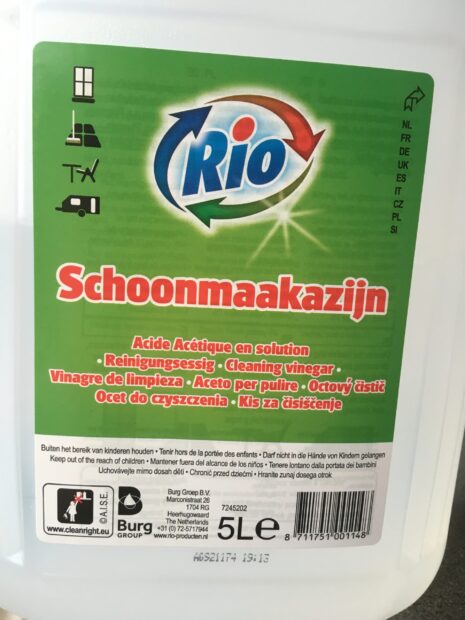
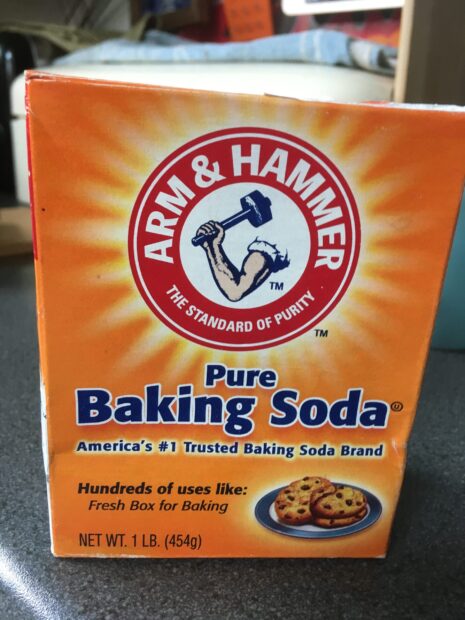
Substitutes for detergents and repellents
Now, did you know you can also use white vinegar and baking soda as substitutes for common more aggressive washing detergents? A common known use of white vinegar is to add it to a wash of new clothes. This to stabilize and even enhance the coloring of your garments. Baking soda is well known next to table salt to remove all kinds of tedious stains, which otherwise can’t be removed by the most modern detergents. Another general known use of baking soda is its ability to absorb nasty odors from your refrigerator.
All these remedies for your household, home and garden have proven to be safe. What is also particularly important, is that those old methods are in fact much more environmentally friendly than our contemporary ones we can buy at our local supermarket.
And guess what, the concoctions of your grandmother also do a better job and are way cheaper.
This is not a paid advertisment for White Hammer Baking Soda. The particular brand in the photo is one of those brands that sell baking soda at a reasonable price, which makes the purchase of baking soda a very affordable cleaning aid.
Use of vinegar and baking soda in the garden
Furthermore, these readily available materials can also be used in the garden. White vinegar as a remedy for your household, is suited very well to increase the acidity around Hydrangaea. These plants love a more acidic soil and flower very well with just a few drops of white vinegar. Also, white vinegar can be used as a natural substitute for all kinds of weed repellents. If you want to get rid of weeds between your pavement, white vinegar does the job.
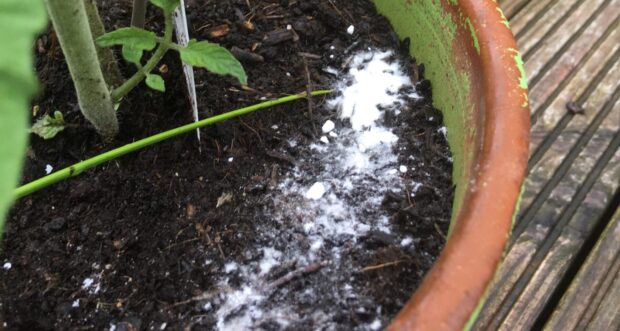
Baking soda spread round the tomatoes
The use of baking soda in your garden as a remedy for your household is very versatile:
- Improve photosynthesis
- Boost your plants energy
- Create a more alkaline environment for your plants
- Keep your cut flowers fresh
- Yield more sweet tomatoes
- Test the pH of your soil
- Prevent fungal disease from expanding
- Fight and prevent dry mildew
- Protect and maintain tomatoes against fungal disease
- Organic garden repellent
- Bug repellent for aphids and mites
- General bug repellent
- Ant repellent
- Gnat killer
- Concentrated bug repellent
- Slug repellent
- Cabbage worm killer
- Crabgrass and weed repellent
- General organic weed killer
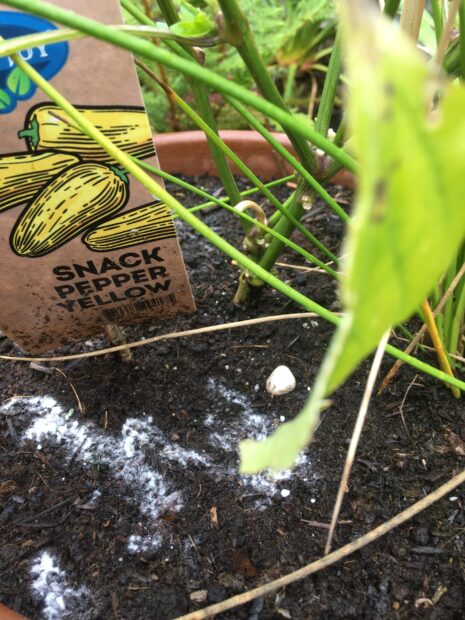
Improve photosynthesis with remedies for your family home and garden
You can use baking soda to improve your plants photosynthesis. You simply sponge your plants leaves with a mixture of about a liter of water and a half teaspoon of baking soda.
Boost your plants energy
When your plants look drowsy or faint, without energy, you can boost them with a mixture of 2 to 2,5 liters of water in which you add a teaspoon of baking soda, a teaspoon of epsom salt and a half teaspoon of ammonia.
Our somewhat hurt and listless peppers aided with some baking soda.
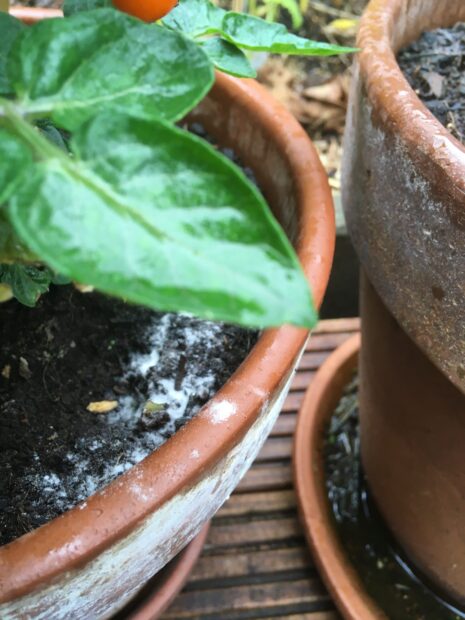
Create a more alkaline environment for your plants
Since baking soda is alkaline, it helps several plants, who need a more alkaline environment, to bloom proficiently. Plants like your Hydrangeas, Begonias and Geraniums bloom the entire season when you feed them monthly with a mixture of a tablespoon of baking soda in two liters of water.
Keep your cut flowers fresh
For keeping your cut flowers fresh, you can use the equal mixture as for your alkaline loving plants.
Yield more sweet tomatoes with home remedies for your garden
To yield more sweet tomatoes, you can use baking soda together with epsom salt.
Test the pH of your soil
You can also use baking soda as a remedy for your family garden to determine if your soil is either acidic or alkaline. Simply take two samples of soil from your garden and put them in separate cups. In the first cup add a half cup of vinegar. Now stir your soil sample. If the content starts to bubble, the soil in your garden is alkaline. Subsequently, on average the pH level of your soil is seven or more. If it doesn’t bubble, take the second cup and add a half cup of water with a tablespoon of baking soda. When the soil starts to bubble, your soil is acidic, generally at a pH of below seven. To decrease the acidity of the soil you can regularly sprinkle baking soda before you water your garden. Don’t forget to regularly test your soil, until the alkaline level is restored.
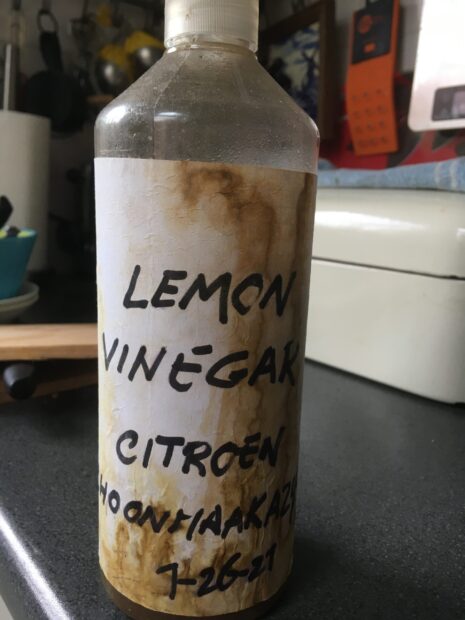
Homemade lemon scented vinegar, ready for use in a recycled bottle.
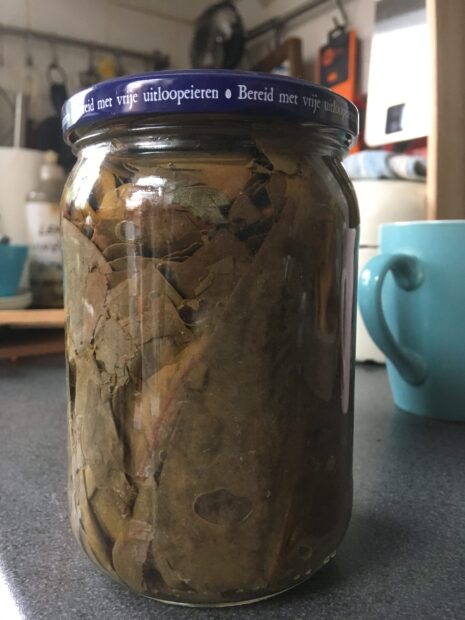
Eucalyptus leaves drenched in white vinegar. For a lovely scented home made detergent.
Prevent fungal disease from expanding
Baking soda can also be used to prevent fungal disease in your plants from further expanding. Mix a liter of lukewarm water with a teaspoon of baking soda and a drop of biodegradable dish detergent. Put this mixture in a spray bottle and mist the top of your affected plants during the morning hours of cloudy days. This, so your plants won’t stay too moist. During the day the mixture will still evaporate.
Use remedies for your house and garden to prevent and fight dry mildew
When a fungal disease in your plants has lead to ‘dry’ mildew, strengthen the solution by instead of the teaspoon adding tablespoons of the above mentioned ingredients. Also, add a tablespoon of vegetable oil. This in 4 to 4,5 liters of water. Only mist your plants with this solution on cloudy days. Otherwise, in direct sunlight, this mixture will cause sunburns on your plants. Lilacs, Zinnahs, Squash and Cucumbers will especially benefit from this mixture.
Protect and maintain tomatoes against fungal disease
Tomatoes are very well known to be sensitive to fungal disease. To prevent and cure your tomatoes from infestation, you can treat them with a mixture of 4 to 4,5 liters of water, in which you mix to tablets of aspirin and two tablespoons of baking soda.
Organic garden repellent
Other great remedies for your home and garden are bug repellents.
Baking soda, combined with fish oil, dish soap in single tablespoon units, added by two units of paraffin oil, horticultural grade, 2 to 3 drops of green fermented fertilizer and about 4 to 4,5 liters of water, makes an excellent organic garden spray. This mixture can be used to treat and prevent several plant diseases and pests. Use this solution monthly, after you water your plants in the evening. Consequently, you will urge the beneficial insects to flee, so the mixture won’t affect them as much. This mixture works well against mites and aphids, as different fungi and mildew.
Bug repellent for aphids and mites
To fight mites, aphids and other well known garden bugs, you can also use a milder repellent. This consists of a liter of water, two thirds of a cup of olive oil and a teaspoon of baking soda.
General bug repellent
Grandma’s remedies for your household can also work as excellent bug repellents. By adding ten to twelve drops of dish soap, and replacing the water for lukewarm you can use this spray for even a wider range of insect infestation.
Ant repellent
Powdered sugar combined with baking soda one to one is an excellent substitution for any commercial ant repellent. Powdered sugar is preferred because it is similar in size, hence the ants cannot just take out the larger chunks.
Gnat killer
To get rid of gnats, which may infest your compost pile, combine four tablespoons of baking soda, a teaspoon of dish soap and four to four and a half liters of water. Moist your compost pile with this mixture and the gnats will be history.
Concentrated bug repellent
Another perfect insect repellent made from baking soda, is to mix a teaspoon with a third cup of mustard oil. Add some lukewarm water just before you start using it on the area where the insects thrive. This mixture also gets rid of mosquito infestation.
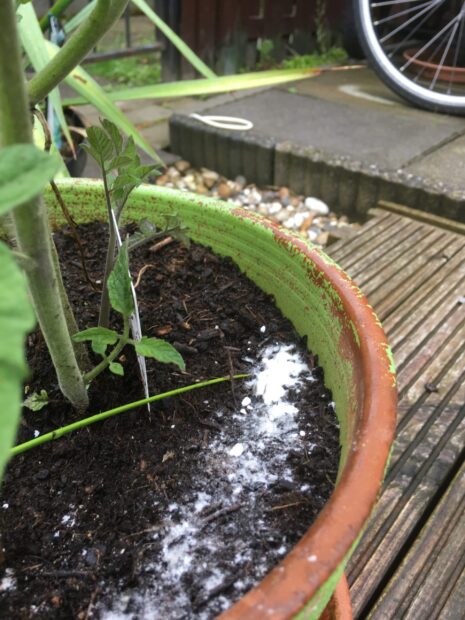
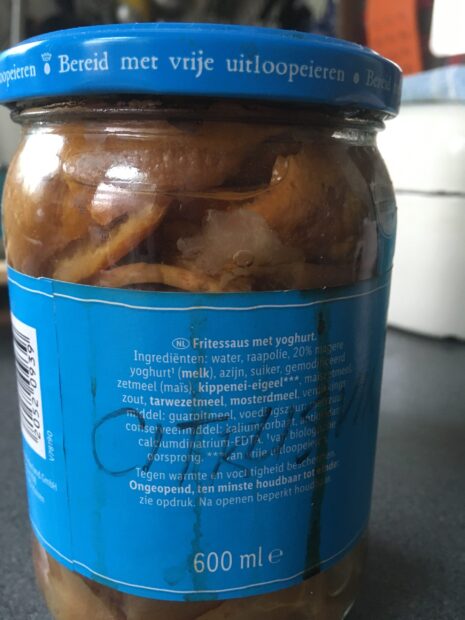
Slug repellent
When you experience an infestation of slugs, sprinkle baking soda on the soil around the plants that get affected. The baking soda will kill the slugs. Be careful, however, to not get baking soda on your plants. When pure baking soda comes in direct contact with the leaves it will burn them and eventually these leaves will die off.
Cabbage worm killer
Growing cabbage, kale, broccoli and other Brassica plants can be an ordeal when they get infested with cabbage worms. To fight them, make a one on one mixture of flour and baking soda. Dust your Brassicas and the worms will see the end of day.
Lemon scented vinegar in the home made making.
Crabgrass and weed repellent
Remedies for your family home and garden as repellents against all kinds of persistent weeds. You won’t need nasty chemicals any longer. Crabgrass and other fast spreading weeds can be hard ones to tackle. Soak them thoroughly when you’re watering your garden. Then sprinkle them with pure baking soda on the leaves and around the stems.
General organic weed killer
Remedies for your household as organic weed killers. You can also make a strong solution of baking soda, white vinegar and some dish soap to get the same result with your persistent weeds.

An astonishing yield
Considering our garden isn’t that big, the total surface of the backyard amounts 48 square meters. It is truly wondrous how much our raised beds yielded for their first year. The beds on which we tilled our greens cover only 18 square meters. In total our garden is still for over 60% covered. However, even during heavy rainfall we no longer see prolonged puddles.
Of course it is a larger surface then most people have available on a balcony adjacent to their apartment. Nevertheless, it shows how the smallest surface can even make a slight difference. Especially where we also consider the joy and happiness a green environment contributes to.
But even on a balcony or in an apartment you can make excellent use of grandma’s remedies for your household.
Ground up eggshells to use in the garden for their calcium, and as slug repeller.
Don’t overdo it
Baking soda is an excellent substitute for available chemical repellents. However, just as with these chemicals, don’t overuse it. For, it will lose its efficacy when used too much.
That’s another one of our grandma’ s advices and recommendations, even with these remedies for your house, don’t overdo it.
Dandelions also flourish on baking soda.
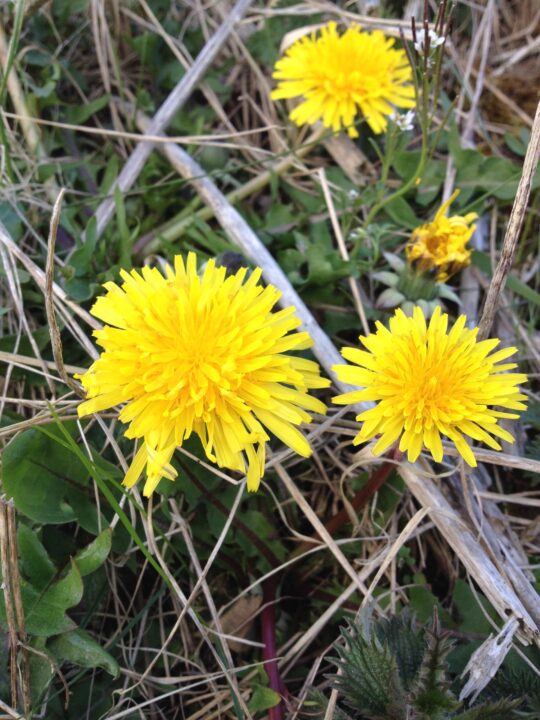
More to come on our blog
There’s a lot more you can do with readily available materials like baking soda, white vinegar and other products. In our blog we will provide you with regular updates of our discoveries and recommendations. Be sure to follow this special category on our upcoming blog pages..
Also look for our page on home formulas you can make yourself >> here